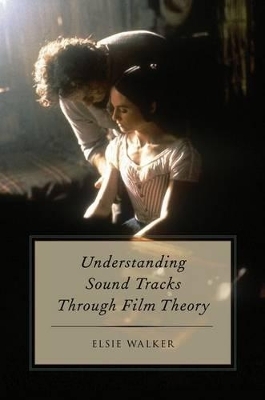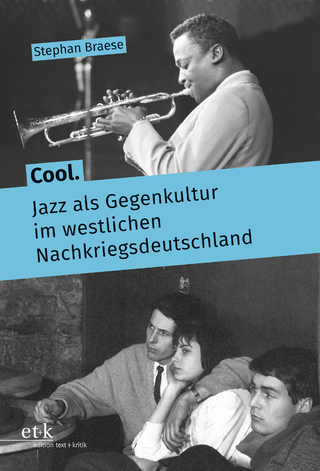
Understanding Sound Tracks Through Film Theory
Seiten
2015
Oxford University Press Inc (Verlag)
978-0-19-989632-5 (ISBN)
Oxford University Press Inc (Verlag)
978-0-19-989632-5 (ISBN)
Understanding Sound Tracks Through Film Theory analyzes all aural aspects of cinema using several approaches: feminism, genre studies, post-colonialism, psychoanalysis, and queer theory. In her analysis of each sound track, Walker brings together film studies, musicology, history, politics, and culture in an accessible yet rigorous way.
Until recently, most scholars neglected the power of hearing cinema as well as seeing it. Understanding Sound Tracks Through Film Theory breaks new ground by redirecting the arguments of foundational texts within film theory to film sound tracks. The book includes sustained analyses of particular films according to a range of theoretical approaches: psychoanalysis, feminism, genre studies, post-colonialism, and queer theory. The films come from disparate temporal and industrial contexts: from Classical Hollywood Gothic melodrama (Rebecca (1940)), to contemporary, critically-acclaimed science fiction (Gravity (2013)). Along with sound tracks from canonical American films, such as The Searchers (1956) and To Have and Have Not (1944), Walker analyzes independent Australasian films: examples include Heavenly Creatures (1994), a New Zealand film that uses music to empower its queer female protagonists; and Ten Canoes (2006), the first Australian feature film with a script entirely in Aboriginal languages. Understanding Sound Tracks Through Film Theory thus not only calls new attention to the significance of sound tracks-it also focuses on the sonic power of characters representing those whose voices have all too often been drowned out.
Dominant studies of film music tend to be written for those who are already musically trained. Similarly, studies of film sound tend to be jargon-heavy. By contrast, Understanding Sound Tracks Through Film Theory is both rigorous and accessible to all scholars with a basic grasp of cinematic and musical structures. Moreover, the book brings together film studies, musicology, history, politics, and culture. Therefore, Understanding Sound Tracks Through Film Theory will resonate for scholars across the liberal arts, and for anyone interested in challenging the so-called "hegemony of the visual."
Until recently, most scholars neglected the power of hearing cinema as well as seeing it. Understanding Sound Tracks Through Film Theory breaks new ground by redirecting the arguments of foundational texts within film theory to film sound tracks. The book includes sustained analyses of particular films according to a range of theoretical approaches: psychoanalysis, feminism, genre studies, post-colonialism, and queer theory. The films come from disparate temporal and industrial contexts: from Classical Hollywood Gothic melodrama (Rebecca (1940)), to contemporary, critically-acclaimed science fiction (Gravity (2013)). Along with sound tracks from canonical American films, such as The Searchers (1956) and To Have and Have Not (1944), Walker analyzes independent Australasian films: examples include Heavenly Creatures (1994), a New Zealand film that uses music to empower its queer female protagonists; and Ten Canoes (2006), the first Australian feature film with a script entirely in Aboriginal languages. Understanding Sound Tracks Through Film Theory thus not only calls new attention to the significance of sound tracks-it also focuses on the sonic power of characters representing those whose voices have all too often been drowned out.
Dominant studies of film music tend to be written for those who are already musically trained. Similarly, studies of film sound tend to be jargon-heavy. By contrast, Understanding Sound Tracks Through Film Theory is both rigorous and accessible to all scholars with a basic grasp of cinematic and musical structures. Moreover, the book brings together film studies, musicology, history, politics, and culture. Therefore, Understanding Sound Tracks Through Film Theory will resonate for scholars across the liberal arts, and for anyone interested in challenging the so-called "hegemony of the visual."
Elsie Walker is Associate Professor of Film Studies at Salisbury University, Maryland. She has taught film in three countries (New Zealand and England, as well as the United States) and she has published many articles on film, sound tracks, and adaptations of Shakespeare. She co-edited Conversations With Directors (2008), and she is coeditor-in-chief of Literature/Film Quarterly.
General Introduction ; Part One: Genre Studies ; Part Two: Postcolonialism ; Part Three: Feminism ; Part Four: Psychoanalysis ; Part Five: Queer Theory ; Coda ; Select Filmography ; Further Perceiving ; Select Glossary ; Index
| Erscheint lt. Verlag | 9.4.2015 |
|---|---|
| Verlagsort | New York |
| Sprache | englisch |
| Maße | 175 x 249 mm |
| Gewicht | 794 g |
| Themenwelt | Kunst / Musik / Theater ► Film / TV |
| Kunst / Musik / Theater ► Musik ► Musiktheorie / Musiklehre | |
| ISBN-10 | 0-19-989632-1 / 0199896321 |
| ISBN-13 | 978-0-19-989632-5 / 9780199896325 |
| Zustand | Neuware |
| Haben Sie eine Frage zum Produkt? |
Mehr entdecken
aus dem Bereich
aus dem Bereich
Grundbegriffe, Harmonik, Formen, Instrumente
Buch | Softcover (2021)
Philipp Reclam (Verlag)
7,80 €
Jazz als Gegenkultur im westlichen Nachkriegsdeutschland
Buch | Hardcover (2024)
edition text + kritik (Verlag)
42,00 €


